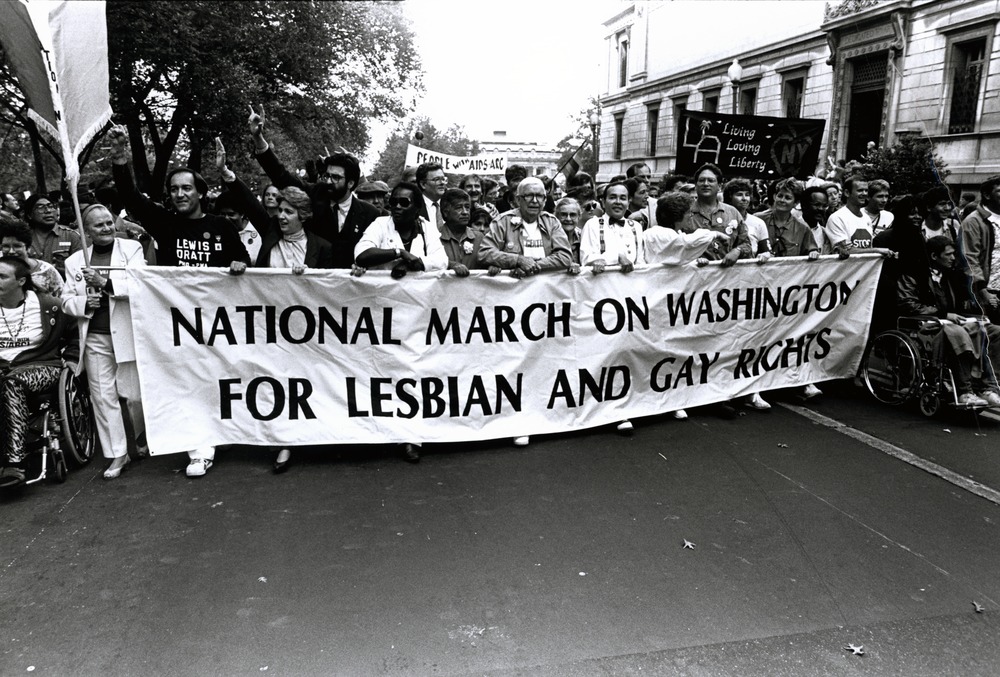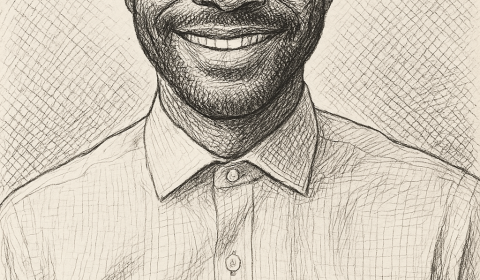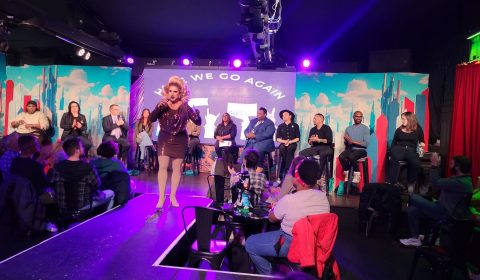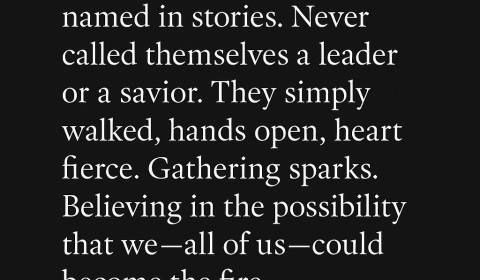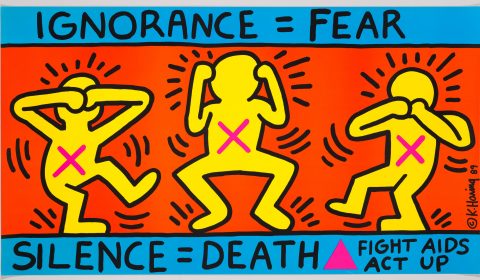Forty-five years ago, on October 14, 1979, tens of thousands of LGBTQ+ individuals and allies came together for the first National March on Washington for Lesbian and Gay Rights. It was a watershed moment in the LGBTQ+ rights movement, not just for its scale, but for the message it sent: that our community was united, determined, and ready to demand change.
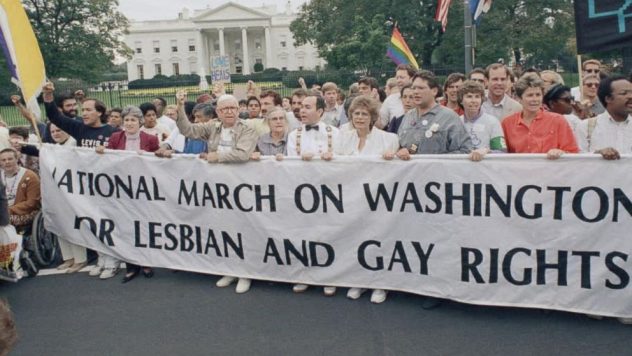 As we consider this moment in history, we also confront the reality that many of the same challenges persist today. While we’ve made significant strides in securing legal protections and social acceptance, the fight for LGBTQ+ equality is far from over. The lessons of 1979—of unity, visibility, and persistent advocacy—are just as relevant today as we continue the struggle for full equality as they were almost 45 years ago.
As we consider this moment in history, we also confront the reality that many of the same challenges persist today. While we’ve made significant strides in securing legal protections and social acceptance, the fight for LGBTQ+ equality is far from over. The lessons of 1979—of unity, visibility, and persistent advocacy—are just as relevant today as we continue the struggle for full equality as they were almost 45 years ago.
The Stonewall Uprisings happened roughly 10 years earlier and in 1979, the LGBTQ+ community continued to fight for basic recognition and dignity in a society that largely sought to ignore or suppress our existence. The 1979 march had five core demands—comprehensive civil rights protections, the repeal of discriminatory laws, equal parenting rights, freedom from workplace discrimination, and an end to anti-LGBTQ+ immigration policies—were bold and radical at the time. Today, we see echoes of those same demands in the ongoing push for the Equality Act, efforts to safeguard marriage equality, and the urgent fight against laws targeting transgender individuals.
The march was more than a gathering; it was a declaration that LGBTQ+ people would not be invisible or silent. For many who marched, this was their first time stepping out of the shadows to publicly declare their identity. The courage required to do so in 1979, when public displays of LGBTQ+ pride were met with hostility, is a reminder of the resilience and bravery that has always fueled our movement.
The 1979 March on Washington laid the groundwork for much of the progress we’ve seen over the last four decades. National and local LGBTQ+ organizations grew in size and influence, and subsequent marches in 1987 and 1993 expanded the movement’s focus to include the fight against AIDS and the push for transgender rights. More recently, in October 2020, thousands of people once again gathered in Washington, D.C., for the National Trans Visibility March, a powerful demonstration that highlighted the ongoing fight for transgender rights and the urgent need to address violence against trans individuals, particularly Black trans women.
The 2020 march underscored many of the same themes as the 1979 march—visibility, resilience, and the fight for legal protection. Like in 1979, participants in the 2020 march demanded an end to violence, discrimination, and invisibility, particularly for the most marginalized within the LGBTQ+ community. In this way, the 2020 march echoed the spirit of 1979 while reflecting the evolving understanding of intersectionality and the need to focus on the most vulnerable within our movement.
Yet, despite advancements and demonstrations of solidarity, the core issues from 1979 remain unresolved for many in our community. Today, the attacks on transgender youth, the spread of “Don’t Say Gay” bills, and the rise of anti-LGBTQ+ rhetoric in political discourse remind us that our hard-won rights are still under threat. The challenges we face today are part of a long continuum of struggle—just as LGBTQ+ activists in 1979 fought for visibility and protection, so too must we continue the fight for the most vulnerable members of our community.
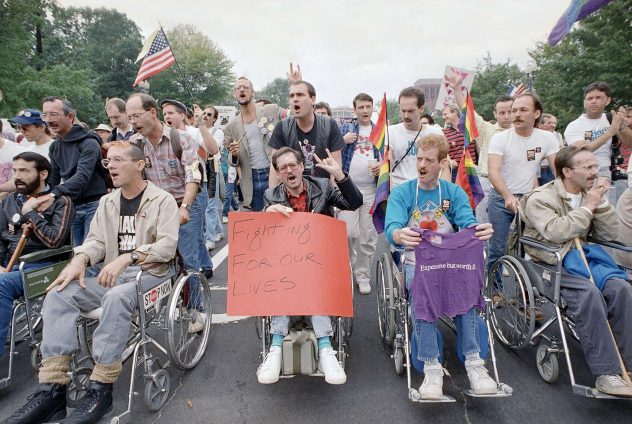 One of the most significant evolutions in our movement since 1979 has been a greater awareness of the intersections between race, gender, and sexuality–among other identity characteristics. The LGBTQ+ rights movement is no longer just about fighting for legal recognition or protection—it is about addressing the broader systemic inequalities that affect marginalized people within our community. LGBTQ+ people of color, particularly Black trans women, face disproportionately high rates of violence, poverty, and discrimination. These are the intersections that demand our attention if we are to achieve true equality.
One of the most significant evolutions in our movement since 1979 has been a greater awareness of the intersections between race, gender, and sexuality–among other identity characteristics. The LGBTQ+ rights movement is no longer just about fighting for legal recognition or protection—it is about addressing the broader systemic inequalities that affect marginalized people within our community. LGBTQ+ people of color, particularly Black trans women, face disproportionately high rates of violence, poverty, and discrimination. These are the intersections that demand our attention if we are to achieve true equality.
The 1979 march focused on the LGBTQ+ community’s legal rights, but today we recognize that legal victories alone are not enough. We must also fight for economic justice, racial equity, and healthcare access, particularly for those who are often left out of mainstream LGBTQ+ advocacy. As we celebrate LGBTQ+ History Month, we recognize the activists who paved the way by challenging us to make our movement as inclusive and intersectional as possible.
The march of 1979 was a bold, visible act of defiance in a hostile social environment, and the bravery of those activists resonates with today’s movement. Just as the LGBTQ+ community faced backlash then, we see similar hostility now. Trans rights are under attack across the country, and efforts to roll back protections for LGBTQ+ people have become part of mainstream political discourse–our identities are not matters of politics!
If history, and lived experiences, has taught us anything, it is that resilience is key.
In 1979, LGBTQ+ people stood up against a culture that sought to silence them. Today, we must channel that same courage to resist attempts to erase our progress and to silence us. The backlash we face is not new, but neither is our determination. The LGBTQ+ community’s history of resilience in the face of adversity should remind us that we have overcome before—and we will again.
The courage of those who marched in 1979 has lit the path for generations and will for future generations to come–it is up to us to carry the torch forward. Today the LGBTQ+ community stands on the shoulders of those who marched in 1979. Their fight for visibility, equality, and dignity was, and is, our fight, too. As we confront the challenges of today—whether it be protecting trans rights, combating anti-LGBTQ+ legislation, or addressing the systemic inequalities that persist—we must do so with the same spirit of solidarity and resilience that defined the movement in 1979.
On this 45th anniversary of the 1979 March on Washington for Lesbian and Gay Rights, we honor the past by committing to the future. The challenges we face today may be different in form, but they are rooted in the same struggle for equality and justice. By reflecting on the courage of those who marched in 1979, we find the strength to continue fighting, ensuring that the march for LGBTQ+ rights goes on—until true equality is achieved for all.
Densil Porteous, is a seasoned leader and advocate for humanity. With a multifaceted background in nonprofit leadership, higher education administration, strategic communications & marketing, development/fundraising, venture capital, and social impact.
